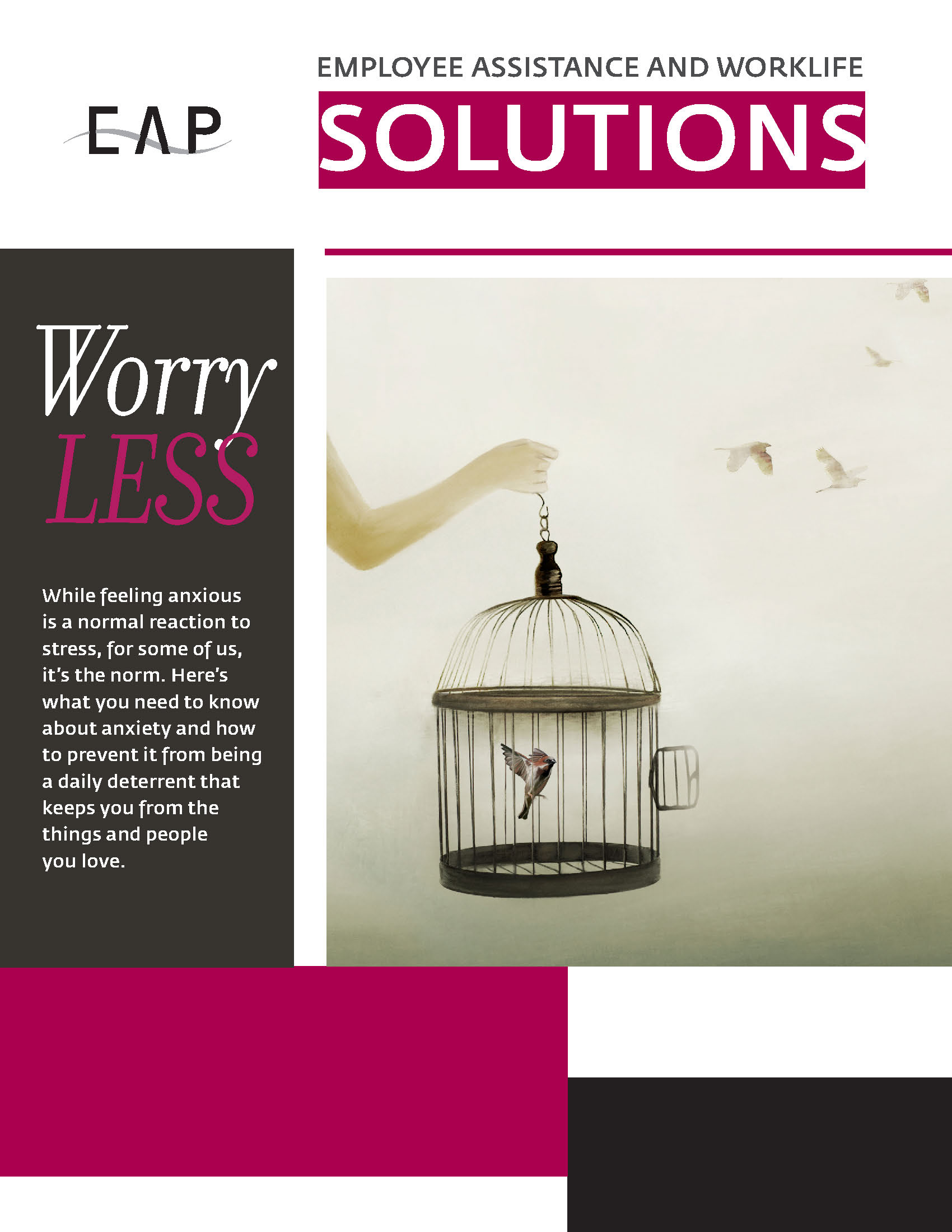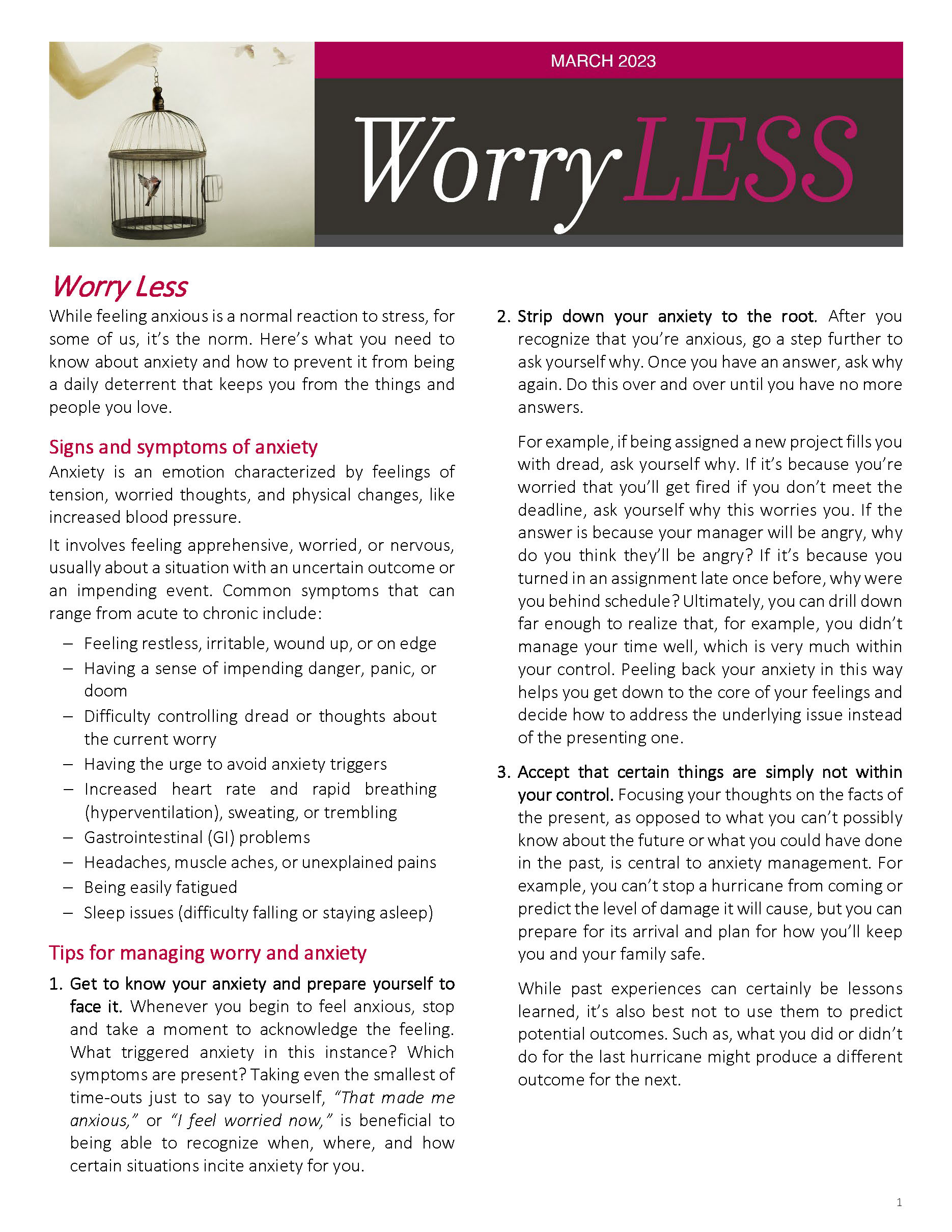
While feeling anxious is a normal reaction to stress, for some of us, it’s the norm. Here’s what you need to know about anxiety and how to prevent it from being a daily deterrent that keeps you from the things and people you love.
Signs and symptoms of anxiety
Anxiety is an emotion characterized by feelings of tension, worried thoughts, and physical changes, like increased blood pressure. It involves feeling apprehensive, worried, or nervous, usually about a situation with an uncertain outcome or an impending event. Common symptoms that can range from acute to chronic include:
- Feeling restless, irritable, wound up, or on edge
- Having a sense of impending danger, panic, or doom
- Difficulty controlling dread or thoughts about the current worry
- Having the urge to avoid anxiety triggers
- Increased heart rate and rapid breathing (hyperventilation), sweating, or trembling
- Gastrointestinal (GI) problems
- Headaches, muscle aches, or unexplained pains
- Being easily fatigued
- Sleep issues (difficulty falling or staying asleep)
Tips for managing worry and anxiety
- Get to know your anxiety and prepare yourself to face it. Whenever you begin to feel anxious, stop and take a moment to acknowledge the feeling. What triggered anxiety in this instance? Which symptoms are present? Taking even the smallest of time-outs just to say to yourself, “That made me anxious,” or “I feel worried now,” is beneficial to being able to recognize when, where, and how certain situations incite anxiety for you.
- Strip down your anxiety to the root. After you recognize that you’re anxious, go a step further to ask yourself why. Once you have an answer, ask why again. Do this over and over until you have no more answers.
For example, if being assigned a new project fills you with dread, ask yourself why. If it’s because you’re worried that you’ll get fired if you don’t meet the deadline, ask yourself why this worries you. If the answer is because your manager will be angry, why do you think they’ll be angry? If it’s because you turned in an assignment late once before, why were you behind schedule? Ultimately, you can drill down far enough to realize that, for example, you didn’t manage your time well, which is very much within your control. Peeling back your anxiety in this way helps you get down to the core of your feelings and decide how to address the underlying issue instead of the presenting one. - Accept that certain things are simply not within your control. Focusing your thoughts on the facts of the present, as opposed to what you can’t possibly know about the future or what you could have done in the past, is central to anxiety management. For example, you can’t stop a hurricane from coming or predict the level of damage it will cause, but you can prepare for its arrival and plan for how you’ll keep you and your family safe.
While past experiences can certainly be lessons learned, it’s also best not to use them to predict potential outcomes. Such as, what you did or didn’t do for the last hurricane might produce a different outcome for the next. - Talk about it. Consistently feeling anxious can be isolating and debilitating, and your anxiety may only get worse if you suffer in silence. Open up to family and friends and lean on them for support. Tell them what makes you anxious in certain situations and what they can do to help alleviate those feelings. For example, if you feel anxious in social situations, ask friends to go in first when entering a room full of people or tell your family that you feel more comfortable ordering dinner last at a restaurant. It’s also important to speak with a professional who can appropriately diagnose your anxiety, suggest coping skills, and offer appropriate treatment options.
When to seek professional support
Experiencing situational anxiety in response to stressful situations is normal. It’s common to occasionally worry about your family, health, and finances, or to feel nervous before an important presentation or a difficult conversation. It’s also typically temporary, limited only to the time leading up to the conclusion of a particular event. In other words, once your presentation or the conversation ends, so does the anxiousness.
Conversely, anxiety that persists beyond the span of a specific stressor, is difficult to control, or is caused by a non-threatening event could indicate something more severe. This more significant form of anxiety is marked by consistent, sudden feelings of intense anxiety and fear about everyday events to the point that it interferes with daily activities. For example, if you avoid certain situations, places, people, or activities to fend off feelings of anxiety and/or it affects job performance, relationships, etc., you should discuss it with a medical physician or licensed therapist.
Download the Campaign
|
Poster |
PDF Newsletter |
PT Newsletter |
|
Your EAP can help 24 HOURS A DAY
The EAP is a voluntary and confidential employee benefit available to eligible federal employees at no cost. |




